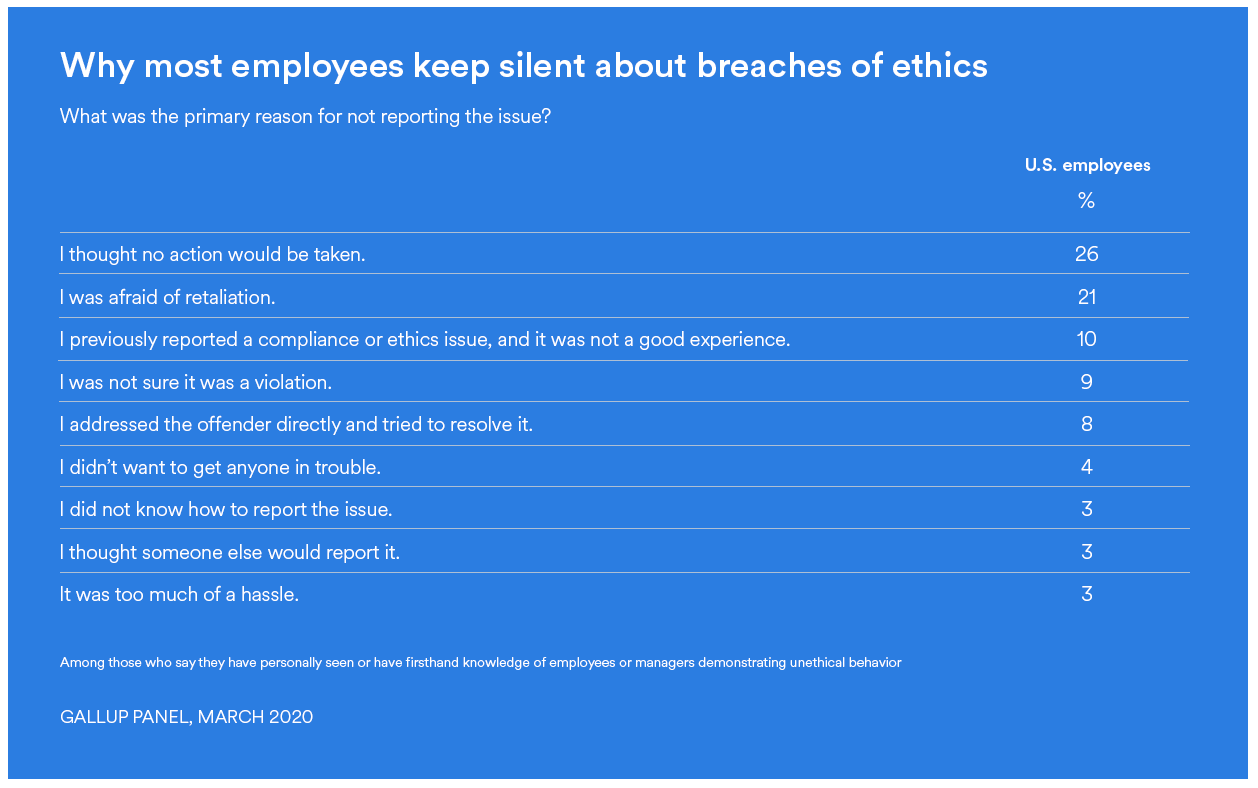A Gallup Panel study of the U.S. working population found that of the 24% of respondents who reported seeing or being aware of unethical behavior in their workplace – less than half of them, only 47%, chose to report the issue. When your organization’s compliance relies on your employees’ behavior and reporting, that number should scare you. You could be missing hundreds of violations that could lead to serious problems down the road.
Why do employees stay silent? Based on the Gallup survey below, the main reasons why employees don’t report unethical behavior is because of culture. If leadership responds negatively to claims or they don’t respond at all, employees feel that. It breeds a toxic culture of silence, fear and mistrust, and those are breeding grounds for noncompliance. It’s cheaper and safer to be proactive than reactive.

How culture drives behavior
Culture is one of the biggest motivators for employee behavior. What is culture? Culture is your organization’s identity; it’s what you value and how you show it. Part of how you show it are the processes and procedures you set, and your employees’ perceptions of which behaviors are valued and how they are rewarded. It’s how your employees experience your organization, and the norms and patterns that form over time, that make up your culture. Much of this happens organically, but that can spell danger if things turn toxic.
You can’t train your employees into being compliant. True compliance comes from a strong culture. According to Gartner, companies with strong cultures outperform weaker cultures. In strong cultures:
- Employees are 90% less likely to observe misconduct.
- Employees who observe misconduct are 1.5 times more likely to report it.
- Employees are more than twice as likely to be engaged with their job and company, and almost 2.5 times more likely to exhibit higher levels of discretionary effort.
“Knowing the wrong thing to do doesn’t necessarily translate into doing the right thing.”
– Gartner
What influences culture?
A strong culture influences everyday employee behavior. But how can you build/lay the groundwork for a strong culture when culture feels so intangible? Below are four key aspects of culture and how they interact with and support each other. When you focus on intentionally infusing integrity into these four areas, you can begin to build a strong culture of compliance.
- Leadership
While workers at every level of an organization need to be onboard, executives set the tone. For most employees, the middle managers impact their behavior the most. Their actions speak louder than words. Often leaders think they are living the organizational culture, but employees don’t perceive their behavior the same way. That’s why surveys are valuable tools to determine how employees think and feel and what influences their behavior. If your employees don’t trust you, you should consider bringing in a neutral, third party to conduct the survey. You can use results to see how you might be inadvertently sending the wrong messages to employees or undercommunicating values.
- Communication
It’s not just what you do, but what you say and how you say it that matters. Are you consistently communicating culture throughout the employee lifecycle? Evaluate how you’re selling your company to potential hires – are you delivering on those promises once they become employees? Is messaging consistent at all levels of the organization? - Processes and structures
Your organization’s structure impacts who talks to who, when, about what and how. Structure impacts workers at every level, as well as clients. Structure directly impacts how employees report ethics breaches and how they are handled. How does your structure support culture, values, brand, employee growth, etc.Processes for reporting incidents should be easy for employees to access and intuitive to use. The technology that supports these processes should make it easy for managers to track claims and address misconduct. If you remember, some of the respondents from the Gallup survey didn’t know how to report an issue or thought it was too much work. Effective and efficient processes remove barriers to reporting and resolution and ensure problems are handled appropriately. - Performance management
Your culture reflects what you reward, whether it be good or bad behavior. Using performance management to support a culture of integrity can remedy that. You can positively reinforce ethical behavior by visibly recognizing when employees exemplify the culture and compliance. Integrity should be a part of how you evaluate, promote and compensate workers.Performance management also gives you the chance to course correct when employees need more guidance. This one-on-one time with your employees also establishes a level of responsibility and accountability when it comes to behavior. And helps you see whether your communication and processes and values are consistent and in sync.
“An organization is a community of people with common interests and shared values, banded together to achieve a common goal. When people work together toward these shared goals, success follows.”
– Deloitte, Global Human Capital Trends 2014: Engaging the 21st – century workforce
All of these areas should be aligned with your organization’s values. Integrity should be at the core of your leaders’ actions, of your policies and your processes. It’s at that point that it will be at the core of your people too. When your culture encourages good behavior, it’s easy for employees to live it and for you to fix compliance issues when they appear.
